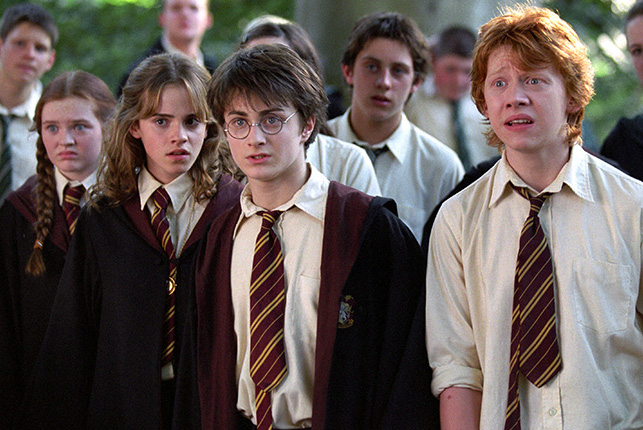Does the Harry Potter row hint at the start of a new era at Sky?

Opinion
As Sky sues Warner Bros Discovery over its refusal to partner on the upcoming Harry Potter series, is the UK broadcaster potentially facing its Götterdämmerung?
“Warner’s reason for refusing to honour its obligations to Sky could not be more clear: Warner has chosen to keep the Harry Potter series for itself and make the blockbuster series the cornerstone of its own Max roll-out in Europe.”
That’s from the claim filed by Sky in September, accusing Warner Brothers Discovery (WBD) of breach of agreement.
Back in March 2023, I posited in these very pages that Sky would likely be in for a rude awakening regarding WBD over its HBO output deal.
If Sky doesn’t renew its HBO deal, do its own scripted originals have the ‘It Factor’?
With the planned UK launch of Max in 2025, it was inevitable that the streamer would require eye-catching titles for its inventory — and Sky was going to be in the soup, unless it was willing to shell out equally eye-watering fees.
Sky appeared to be engaged in a game of chicken with WBD. Sky Studios CEO Cécile Frot-Coutaz told the 2024 Edinburgh TV Festival: “While we all love the big HBO shows, only three of those series are in the list of Sky’s top 20 shows. The homegrown Sky Originals that we commission are incredibly popular with our customer base, so for context that’s worth bearing in mind.”
This conveniently overlooks the sheer volume of HBO programming on Sky and the overall ratings they provide in contrast to the broadcaster’s own productions, which are much fewer in terms of hours and tend to make splashy ratings debuts before fading swiftly (see 2024’s Jacobean romp Mary & George).
The number of returning Sky Original series are rare; only Shameless wannabe Brassic and Gangs of London have proved to have legs in recent years. Danny Dyer comedy-drama Mr Bigstuff has scored a second season, but it’s hardly up there with The Sopranos, is it?
Critically disappointed
The desire for critical ratings hits has proved disappointing. Patrick Melrose (2018) and Chernobyl (2019) were widely acclaimed — a reception Sky surely must have been anticipating for awards bait The Tattooist of Auschwitz (2024). But the show only achieved a Metacritic score of 61 out of 100, indicating “mixed or average reviews”.
The Guardian‘s Jack Seale, for example, wrote: “The Tattooist of Auschwitz is a drama that raises the question of whether fiction can ever be an appropriate response to the Holocaust; on this evidence, perhaps not.” Meanwhile, i‘s Ed Power commented: “Is it possible to make a feel-good Holocaust drama? Should you even try?”
Other Sky Originals, such as the Nick Love 1980s throwback A Town Called Malice (2023), Intergalactic (2021), The Lazarus Project (2022-23), Avenue 5 (2020-22), Two Weeks to Live (2020) and Dreamland (2023), all generally failed to engage audiences on the scale the broadcaster really needs.
Corporate combat?
In a wider context, perhaps Sky is merely a pawn in the wider game of corporate combat between owner Comcast and HBO’s WBD.
Neither side looks to be thinking of compromising over the Potter series, which both believe will be a ratings hit.
Sky’s suit claims that WBD “has repeatedly failed to offer Sky the annually required minimum number of contractually qualifying series. If all that were not enough, Warner has now even brazenly denied Sky its right to partner on Warner’s highly valuable decade-long, tentpole television series adapting JK Rowling’s iconic Harry Potter novels, set to premiere in 2026 or 2027.”
WBD responded equally — if not more — vehemently: “The HBO and Max licensing agreements expire at the end of 2025 and this lawsuit is a baseless attempt by Sky and Comcast to try and gain leverage in its negotiations for our programming beyond that date.
“We know HBO branded shows are critical to Sky, as evidenced by their desire for over a year to find a way to renew our agreements, and this lawsuit makes it clear that Sky is deeply concerned about the viability of its business were it to lose our award-winning content.
“WBD will vigorously defend itself from this unfounded lawsuit as we move forward undeterred with plans to launch Max, including the new HBO Harry Potter series, in the UK and other European markets in 2026.”
High stakes
Reports in July that WBD was in talks with Sky’s rivals over Max carriage also reinforce the impression that greater stakes than just a Harry Potter show are at play.
The show, of course, follows the depressing industry trend to rinse every last eyeball out of popular intellectual property, hence Amazon’s woeful The Rings of Power, Netflix’s upcoming Narnia series and the threatened Hunt for Gollum movies.
If the struggle gets really dirty, as well it might, Sky will be in dire need of quality popular programming and in sufficient volume from distributors to make up for the loss of HBO shows.
Knowing when to leave
Still, someone has emerged from the situation in fine fettle: Zai Bennett, outgoing managing director of content at Sky UK and Ireland, soon to become CEO/chief creative officer at BBC Studios, before the proverbial shit has really hit the fan.
It’s a talent my former colleague also ably demonstrated when he sagely upped sticks to Sky after Danny Cohen made the boneheaded decision in 2014 to make BBC Three an online-only channel.
In the words of the Burt Bacharach/Hal David tune: “Knowing when to leave may be the smartest thing anyone can learn.”
 Stephen Arnell began his career at the BBC and later moved to ITV, where he launched and managed digital channels. He continues to consult for streamers and broadcasters on editorial strategy. Arnell writes for The Spectator, The Independent and The Guardian on film, TV and cultural issues, and he is also a writer/producer (including Bob Fosse: It’s Showtime for Sky Arts) and novelist
Stephen Arnell began his career at the BBC and later moved to ITV, where he launched and managed digital channels. He continues to consult for streamers and broadcasters on editorial strategy. Arnell writes for The Spectator, The Independent and The Guardian on film, TV and cultural issues, and he is also a writer/producer (including Bob Fosse: It’s Showtime for Sky Arts) and novelist




